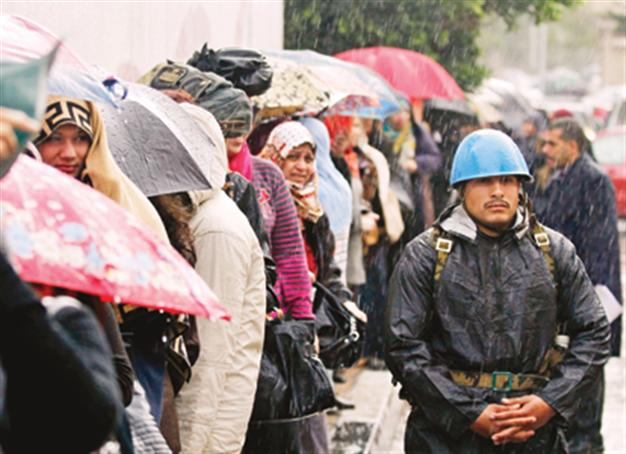
Post-revolution Egypt headed to the polls yesterday for a chaotic election clouded by violence and a political crisis, the start of a long process to bring democracy to the Arab world’s most populous nation. REUTERS photo
Post-revolution Egypt headed to the polls yesterday for a chaotic election clouded by violence and a political crisis, the start of a long process to bring democracy to the Arab world’s most populous nation.
Ten months after the end of 30 years of autocratic rule by Hosni Mubarak, ousted by popular protests in one of the seminal events of the Arab Spring, up to 50 million voters are being asked to choose a new parliament.
Three blocs and 50 parties are participating in the elections. In the first round of the vote, 36 parties out of 50 and 3,809 candidates out of 6,000 are competing for the lower house. Elections will end in March and two chambers of the parliament will be selected separately. A total of 508 deputies will be selected in the election.
Voters in Cairo, Alexandria and other areas began yesterday the first of three steps for elections to the lower house of parliament.
The backdrop was ominous after a week of protests calling for the resignation of the interim military rulers who stepped in after Mubarak’s fall; 42 people were killed and more than 3,000 were injured in the week ahead of the election. By late mid-morning, proceedings appeared to be passing off peacefully and orderly as the military and police forces were discreetly deployed around polling stations where lines formed early in the morning.
The poll was in danger last week as unrest gripped the country, but military ruler Field Marshal Hussein Tantawi has stuck to the schedule and called for a large turnout. The 75-year-old, who served as defense minister under Mubarak for 20 years, inspected polling stations yesterday, state media reported. The head of Egypt’s election commission said turnout in the polls was higher than expected and that there had been no security problems.
Three main parties
A party set up by the formerly banned Muslim Brotherhood, a moderate Islamist group, is widely expected to emerge as the largest power when results are published on Jan. 13. The Freedom and Justice Party was set up in April as the political wing of the Muslim Brotherhood, which was banned under Mubarak but has emerged as one of the most influential forces.
The party has not issued a detailed manifesto. Brotherhood leaders say the party is a civil group that regards Islam as a “reference” point. They say the party seeks a constitution that respects Muslims and non-Muslims, will not impose Islamic law and is committed to a pluralistic and democratic Egypt. The party also includes members from Egypt’s Coptic Christian minority.
Hard-line Islamists, secular parties and groups representing the interests of the former Mubarak regime are all expected to win seats, raising the prospect of a highly fragmented and ideologically split new parliament.
The other influential actor in the yesterday’s elections is the New Wafd Party. Wafd was set up in 1978 after former President Anwar Sadat opened up politics following a period when parties were banned, but its roots date back to the 1920s.
Wafd has traditionally been a bastion of liberal democrats in Egypt and historically drew the support of business elites and Copts. It was one of the opposition parties licensed under Mubarak, although its critics said it was co-opted by the state.
Also, the liberal party, Al-Masryeen al-Ahrar (Free Egyptians) is another influential political party. Co-founded by Christian telecom tycoon Naguib Sawiris, the party has positioned itself as a challenger to Islamist groups. The party, whose leaders include Hani Sarie-Eldin, a former chairman of the Egyptian Capital Market Authority and Central Bank board member, advocates free market policies, the separation of state and religion, ending class inequalities and expanding the middle class.
The party said in August that it had more than 100,000 members, including prominent figures such as writer Mohamed Salmawy, poet Ahmed Fouad Negm, film director Khaled Youssef and Mahmoud Mehny, the former president of al-Azhar University.
Meanwhile, the Tahrir movement, named after the square where protests began against Mubarak, is deeply divided over whether to take part in the elections and lend legitimacy to the military rulers. In Tahrir Square, anti-military diehards said they had no confidence in the process and preferred to stay in the square to keep pushing for an end to military rule.
After two days of voting in the first stage of the elections for the lower parliament, other cities and regions will follow on Dec. 14 and Jan. 3. After these, another round of voting will take place from Jan. 29 for the upper house of parliament; presidential elections, meanwhile, are to be held by no later than the end of June next year.
Mubarak, who is on trial for murder and corruption in Cairo along with his two sons, was expected to be following events from a military hospital in the capital, where he is reportedly being treated for cancer.
Compiled from AFP, AP and Reuters stories by the Daily News staff.